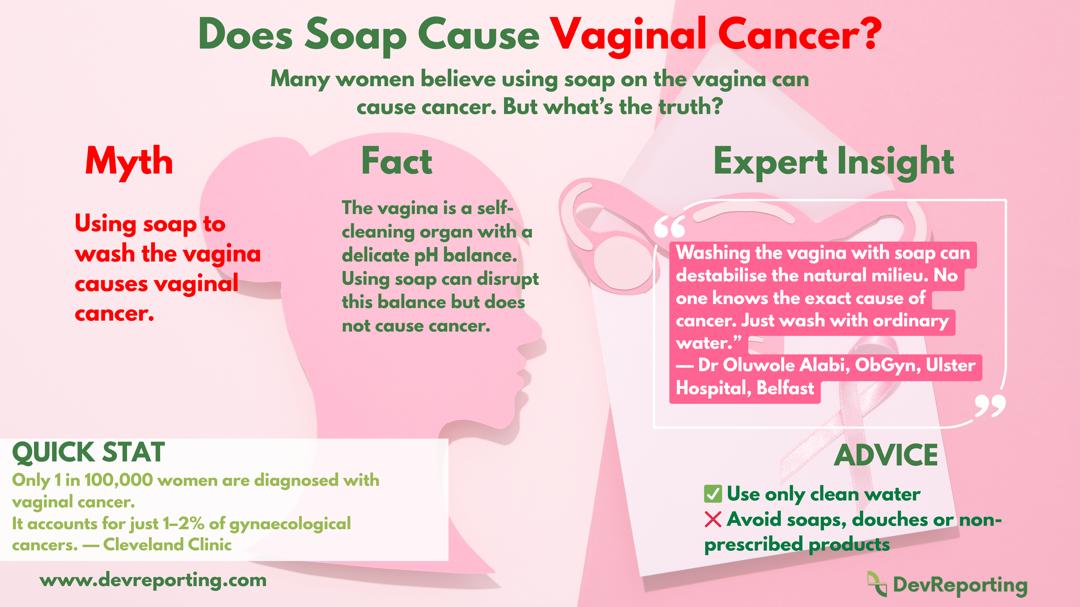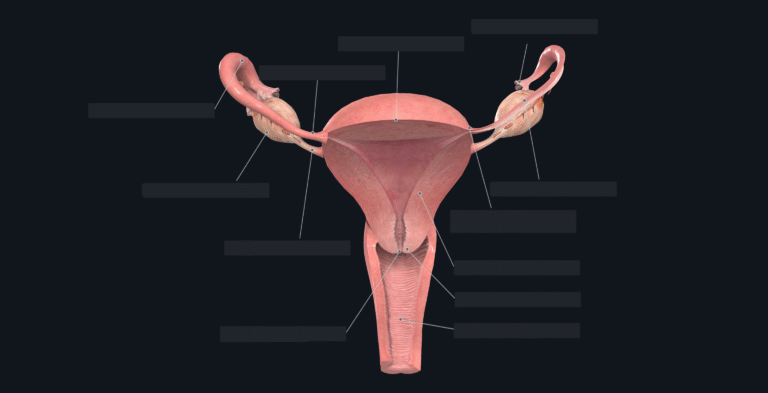Menstruation, sexually transmitted infections (STI), menopause, vagina cancer, among numerous others are reproductive health issues enveloped by misconceptions, and which have led to confusion among many girls and women. In this DevCheck report, we analyse some of the most common misconceptions, providing accurate information to empower our readers to take control of their health.
Does soap cause vagina cancer?
Multiple women who spoke with DevCheck said using soap to wash the vagina can cause cancer; hence, they avoid it.
“Since I was young, my mum told me to be careful about my vagina hygiene, warning me not to use soap because she was concerned it might cause vagina cancer. I’ve since shunned using soap in my early teenage years. I only use water because I don’t want to have cancer,” said Kemi Abiodun, a 27-year-old trader in Lagos.
While Abiodun does not use soap, Chiamaka Ebi has a different approach to vagina hygiene. She uses her regular bathing soap to wash her vagina, believing it’s a normal part of her cleansing routine.
“I used bathing soap to clean whatever dirt that I might have come in contact with,” Ms Ebi explained.
According to experts, vagina is a self-cleaning organ that maintains its delicate pH balance. Excessive scrubbing, douching, or using harsh products can disrupt the natural balance and increase the risk of infections. However, there’s no scientific evidence to support claims that using soap to clean the vagina will cause cancer.
READ ALSO: Does mixing moringa leaves with honey make a crawling child walk faster?
What is vagina cancer?
Vagina cancer is a rare cancer that develops in the muscular canal connecting the uterus to the outside of the body, and it is not as common as thought. According to Cleveland Clinic, an American nonprofit academic medical centre, only one of 100,000 women is diagnosed with vaginal cancer. It’s said to account for only 1 to 2 per cent of gynecological cancers.

Speaking with DevCheck, Oluwole Alabi, an Obstetrician and Gynaecologist at Ulster Hospital, Belfast in the United Kingdom, said the vagina has its natural microorganisms that help to maintain its pH value.
“Washing the vagina with soap can destabilise its natural milieu. This may allow other foreign microorganisms to flourish; in the process, the cells of the vagina may be altered. It must be stated that no one knows the exact cause of cancer. Just wash (the vagina) with ordinary water. Avoid dampness as much as possible,” Mr Alabi advised.
Asked if there are any specific products or ingredients that women should avoid using in the vagina area, the medical practitioner simply said, “Avoid any product not prescribed by doctors. Just wash with clean water. Water has a neutral pH, so it can not affect the milieu of the vagina.”
Do birth control pills cause significant weight gain?
The relationship between birth control pills and significant weight gain is a topic of major debate, as many argue that birth control pills lead to significant weight gain. Studies by Planned Parenthood and Cleveland Clinic have consistently shown that the relationship between birth control pills and weight gain is complex and influenced by various factors, including hormonal changes, water retention, and individual differences.

Some birth control pills contain hormones like estrogen and progesterone, which can cause water retention, leading to temporary weight gain. However, this weight gain is often not due to an increase in body fat, but rather water retention. Additionally, some women may experience an increase in appetite or changes in metabolism, which can also contribute to weight changes.
Despite these potential effects, numerous studies have found that the impact of birth control pills on weight is generally minimal. Although individual experiences can vary, some women may be more prone to weight changes due to hormonal fluctuations or other factors.
READ ALSO: Cycle of Impunity: Hundreds of minors left without parental care amidst attacks in Nigeria
Mr Alabi told DevCheck that: “Weight is one of the risk factors one considers before starting on combined contraceptive pills. However, a woman with a heavy weight may consider a mini-pill (progesterone only) pill. The weight gain is most likely temporary, though,”.

“An obese woman should avoid combined contraceptive pills as they increase the risk of clots in the legs or the lungs. All women should be risk-assessed before starting the pills. Family history of clots, cancer of the breast or womb is important to consider. Such a woman should be offered alternatives”.
Is blood shed by women during menstruation dirty?
The notion that menstrual blood is “impure” is a common myth with no scientific basis. Menstrual blood is a natural and normal part of the female reproductive cycle, comprising blood, tissue, and other fluids. It’s not “impure” in any way.
This notion may have likely stemmed from cultural or societal stigma surrounding menstruation, rather than any factual basis. In reality, menstrual blood is simply the body’s way of shedding the uterine lining when pregnancy doesn’t occur. It’s a natural process that is essential to reproductive health.
“Periods can sometimes stain clothing but this does not justify associating them with a ‘moral stain’ on the character of all people who menstruate. Ink can also stain clothing but society does not restrict the activities and rights of people who carry a pen in their suit pocket,” Menstrual Matters said in a 2018 research.
“Menstrual fluid contains hardly any ‘bad’ bacteria, especially when compared to other parts of the body and items that we regularly touch- e.g. hands, mobile phones, cash, credit cards, or uncooked meat. Menstrual fluid is not an excretory product like urine or faeces; it is not removing toxins from the body. Periods just help keep the lining of the womb in a healthy condition. Periods are only a ‘hygiene’ issue if people cannot access clean water to wash their hands or period products. This makes poverty the problem, not periods.

“Menstrual fluid only smells bad if there is an infection (typically thrush or Bacterial Vaginosis), or it has come into contact with the air, sweat, or the chemicals found in disposable menstrual management products,” the research added.
It’s essential to recognise that menstruation is a normal and natural part of life, and menstrual blood is not inherently “impure” or shameful.
………………………………………………………………………………………………………
Follow DevCheck on DevReporting for more health explainers and expert insights to make informed decisions about your well-being.

